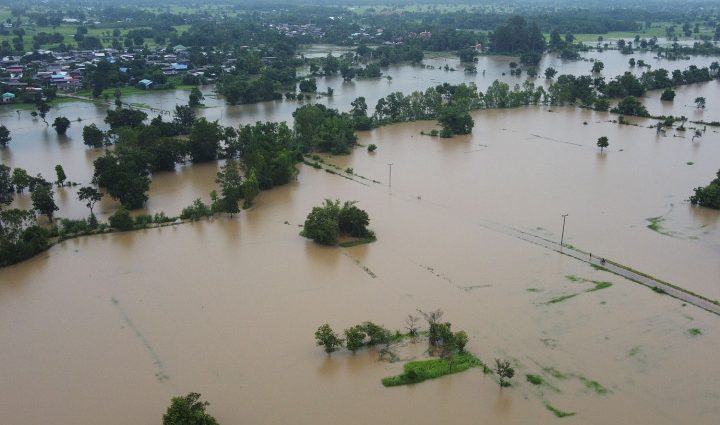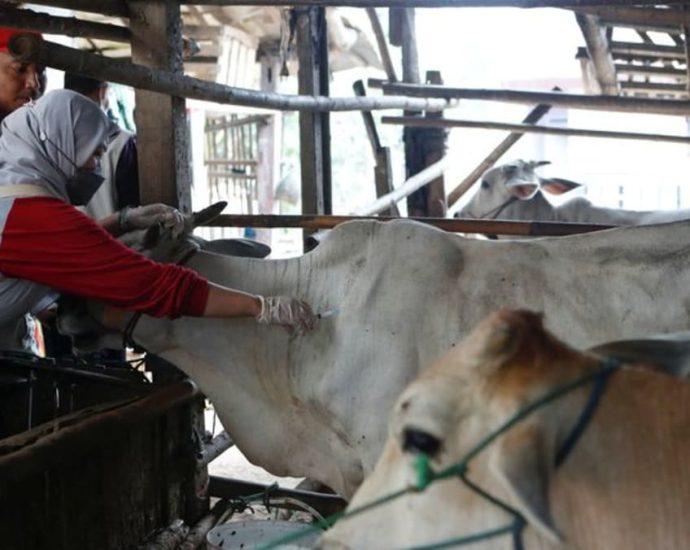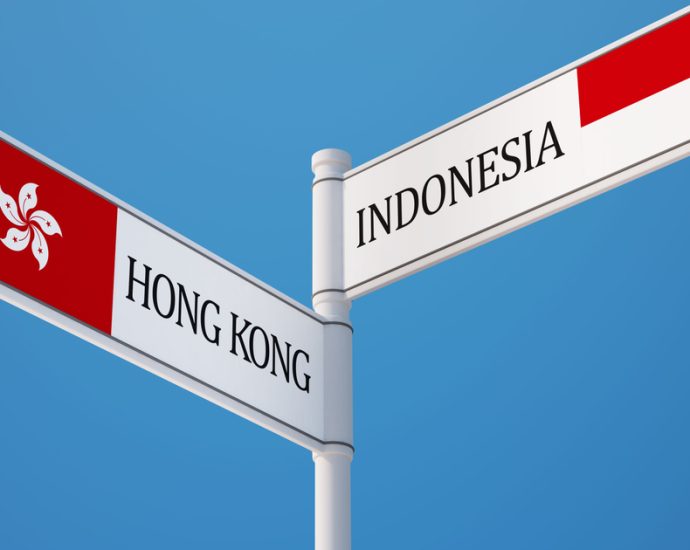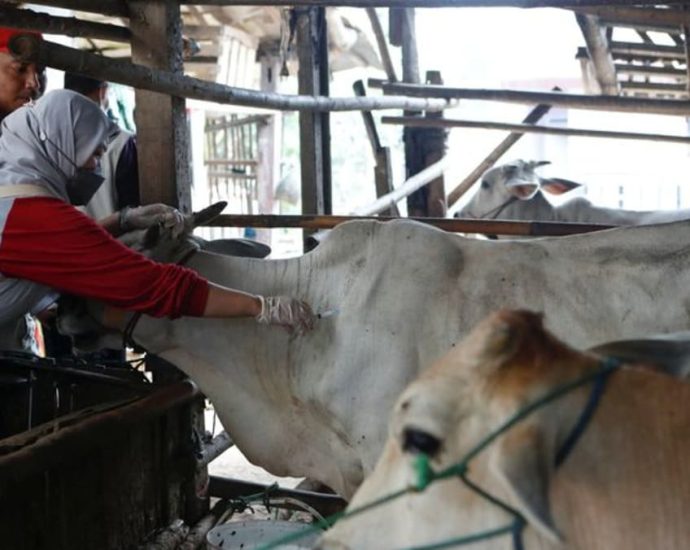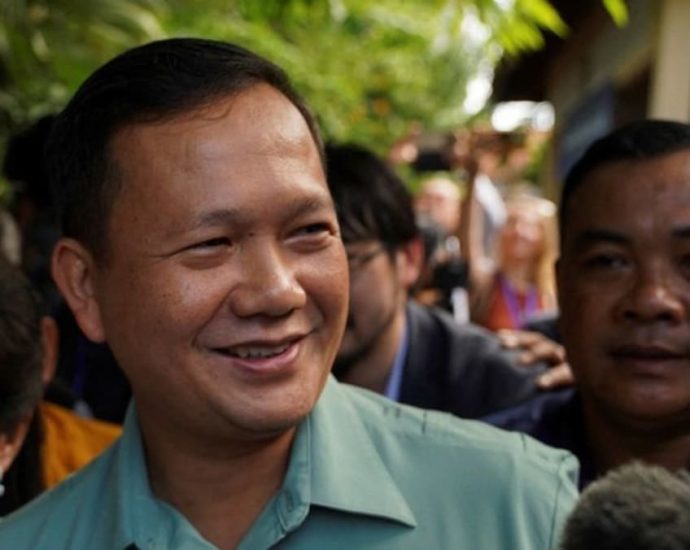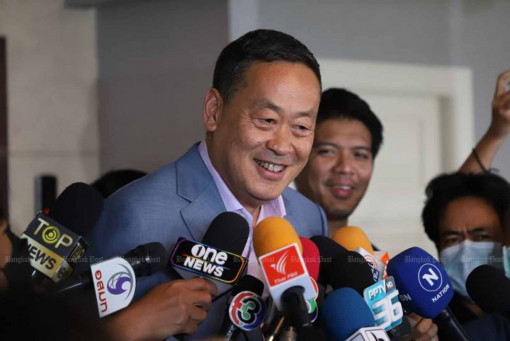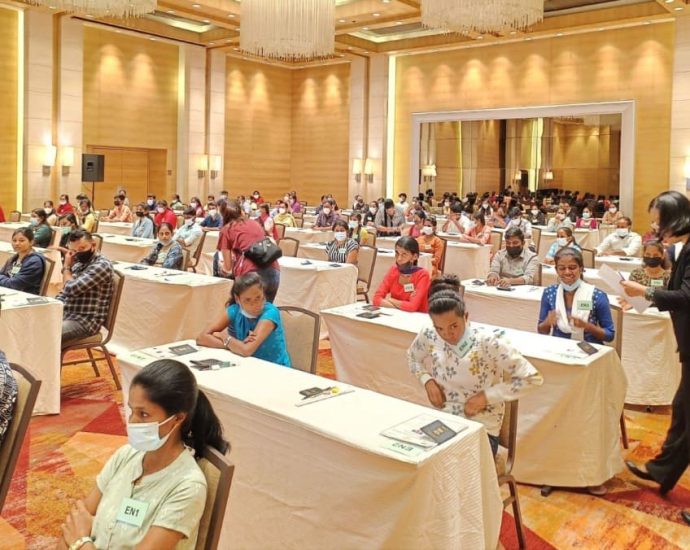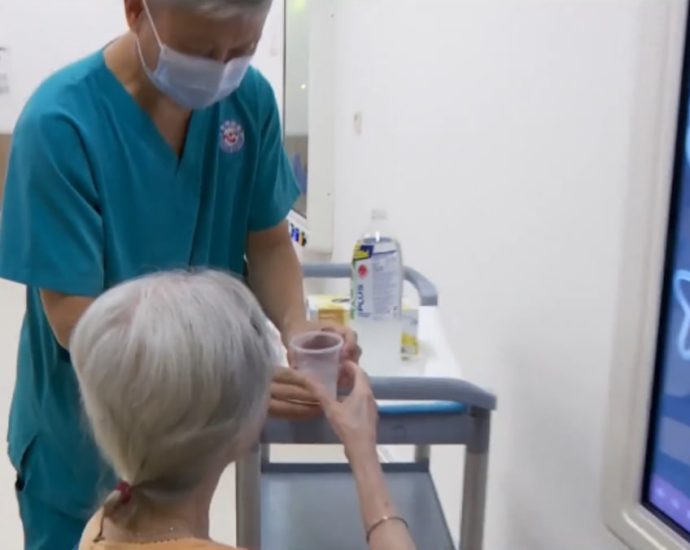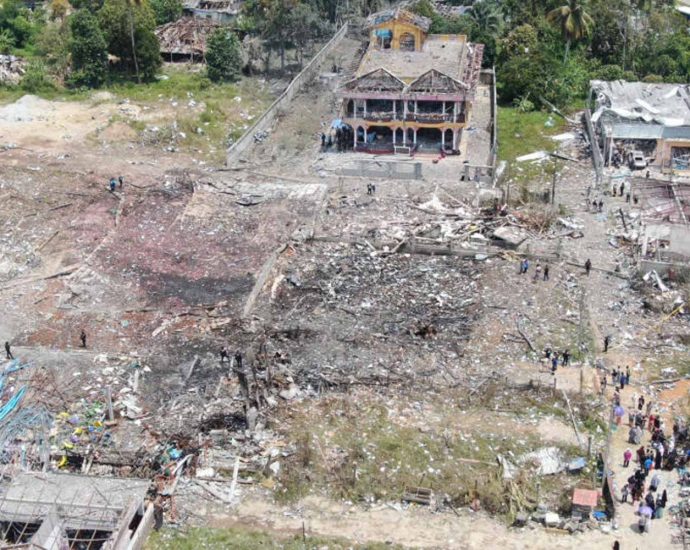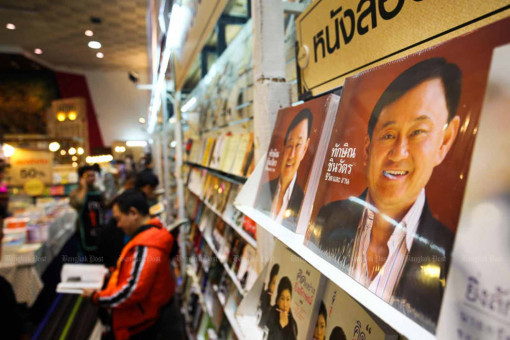Floods hit 1,000 rai of farmland in Nakhon Phanom
Water level of Mekong River also rising steadily
PUBLISHED : 1 Aug 2023 at 18:16

NAKHON PHANOM: Heavy rain pounded this northeastern province overnight, flooding almost 1,000 rai of farmland in That Phanom district.
Hours of downpours triggered runoff from the Phu Phan mountain range, sending a huge volume of water into two tributaries of the Mekong River — Lam Nam Bang and Lam Nam Kam. The rivers overflowed their banks, flooding many areas in That Phanom district and parts of Na Kae district.
Two sub-districts of That Phanom — tambons Fang Daeng and Na And — were the worst hit.
If rain continued and floodwaters did not recede in one week, vast paddy fields were expected to be damaged as water from the tributaries flowed slowly into the Mekong. Water levels in the Mekong River have been rising, by 30-40 centimetres a day.
If the Mekong water level reaches a critical point at 12 metres, many areas will be adversely affected, say forecasters.
Provincial authorities have coordinated with district authorities in areas near the Mekong and mountain ranges — Ban Phaeng, Tha Uthen, Muang, That Phanom and Na Kae districts — to warn local residents to protect their properties against more runoff.
Indonesia suspends imports from 4 Australian facilities after skin disease detected in cattle
JAKARTA: Live cattle imported from Australia by major buyer Indonesia were likely infected with lumpy skin disease (LSD) at home, an Indonesian official said on Tuesday (Aug 1), as the Asian nation put imports from four Australian facilities on hold. Bambang, head of Indonesia’s Agriculture Quarantine Agency who goes byContinue Reading
In-depth: Exploring Hong Kong and Indonesiaâs strategic potential | FinanceAsia

Last week (July 26), Hong Kong Exchanges and Clearing Limited (HKEX) and the Indonesia Stock Exchange (IDX) signed a Memorandum of Understanding (MoU) marking strategic collaboration aimed at strengthening ties and exploring mutually beneficial opportunities across both markets.
According to the announcements, the partnership will see the exchanges meet regularly to develop new capital market products, including exchange-traded funds (ETFs) and derivatives; enable cross-border listings; and promote sustainable finance across the region, through shared best practices and the development of carbon markets.
The releases point to the benefits made available through enhanced cooperation, including access to the international connectivity and vibrance on offer via Hong Kong’s marketplace, as well as the talent, creativity and innovative characteristics of Indonesia’s “new economy” participants.
Discussing the news, Singapore-based Clifford Chance partner, Gareth Deiner, who specialises within the firm’s South and Southeast Asian capital markets practice, shared with FinanceAsia his take on the opportunity presented by forging a deeper connection with the market that is home to world’s largest nickel supply.
“The mutually beneficial aspect of this collaboration is that it offers access to a wide pool of North Asian institutional investors and therewith, an enhanced liquidity pool.”
Shanghai and Singapore-based Clifford Chance partner, Jean Thio, acknowledged the significant number of Indonesian conglomerates that operate outside of the domestic market and seek access to North Asia’s investor community.
She highlighted her work in 2022, advising on the spin-off IPO of Chinese dairy farm operator AustAsia Group, a subsidiary of Indonesian agribusiness, Japfa, as demonstrating this point.
“International issuers look to Hong Kong as a way of accessing international institutional capital. The new collaboration complements other regional initiatives, such as Stock Connect.”
Hong Kong and China’s central banking authorities announced in May the launch of the sixth iteration of the regional bilateral scheme, the northbound channel of Swap Connect. The initiative is the first derivatives mutual market access programme globally and opens up institutional entry to China and Hong Kong’s interbank interest rate swap markets.
In terms of the current trends permeating Indonesia’s capital markets, Deiner shared, “Historically, Indonesia’s future-facing minerals – cobalt, copper and nickel – would be exported. But now these are proving key elements of Indonesia’s onshore energy transition story, as they are core components used in the manufacture of wind turbines, solar panels and electric vehicles (EVs).”
“As such, Indonesia has implemented bans on the export of unprocessed nickel ore, in order to facilitate the development of the EV supply chain onshore.”
Deiner and his team advised the underwriters of Harita Nickel’s IDR9.7 trillion IPO on the IDX in April, which media attributed to being part of a government push to privatise state-owned enterprises (SOEs).
Amit Singh, Singapore-based partner and head of Linklaters’ South and Southeast Asia capital markets practice agreed that the newly formed “super-connection” opens the door to meaningful, increased liquidity for Indonesian companies.
“Hong Kong also gains a valuable link with the growing mining and supply chain powerhouse that Indonesia is developing into,” he told FA.
“Mining, minerals and other supply chain-focussed industries are driving Indonesia’s IPO boom in 2023,” Singh explained, pointing to his involvement in Merdeka Battery’s IDR9.2 trillion ($620 million) IPO in April. The PT Merdeka Copper Gold Tbk subsidiary owns one of the largest nickel reserves globally and has a portfolio of EV battery assets across the Sulawesi region.
“This trend is likely to continue and grow in the upcoming years, and Hong Kong is clearly seeking to position itself closely with Indonesia and its burgeoning strengths in these areas.”
Dual listings
Tjahjadi Bunjamin, Jakarta-based managing partner and head of the finance practice at Herbert Smith Freehills (HSF) partner firm, Hiswara Bunjamin & Tandjung (HBT), agreed that the MoU means that Indonesia will obtain greater access to Chinese issuers and the related international investment base.
“This is particularly important given the dominant role of Chinese companies in the EV ecosystem.”
He explained to FA that the collaboration further enables the exploration of dual listings by both parties: “Both will benefit from a more coordinated approach to listing in the two jurisdictions, as well as more clarity on listing requirements for issuers and investors.”
“Dual listings and increased regulatory cooperation will accelerate the maturation of the Indonesian capital markets, allowing them to more quickly adapt as deal sizes and investor interest and scrutiny in the market widens,” Singh added.
David Dawborn, HSF partner and senior international counsel at HBT, noted that a challenge for the partnership will involve the fact that Indonesia’s capital markets system remains primarily focussed on basic equity and debt securities.
“It could benefit from new ideas and products available through Hong Kong’s capital markets system, which is more flexible and easier to navigate in many aspects.”
In prior discussions with FA, experts have commended Indonesian regulators for their efforts to make the market’s domestic exchange more accessible and attractive as a listing destination.
In late 2021, the Indonesian financial services authority, Otoritas Jasa Keuangan (OJK), approved amendments to the listing regime to allow firms with multiple voting rites (MVR) to participate on the domestic exchange. The move signalled continued progress to bring Indonesia’s capital markets in line with other global exchanges, such as those of the US and Hong Kong, which have had dual class share frameworks in place since the 1980s.
Recent research by the Hong Kong Trade Development Council (HKTDC) citing Refinitiv data suggests that more than 70% and 25% of companies currently listed on IDX meet the minimum capital requirement for listing on Hong Kong’s GEM (which serves small and mid-sized issuers) and main board, respectively. “This implies that there is a huge potential pool of candidates for dual primary and secondary listing,” the report noted.
However, the research added that so far, “only three Indonesian companies domiciled in Indonesia are currently listed overseas, and none are listed in Hong Kong.”
Tech story
Poised to become the seventh largest global economy by 2030, Dawborn underlined Indonesia’s endeavours to become a regional leader for Southeast Asian capital markets, following its success as host of last year’s G20 summit, in Bali.
Already home to a variety of tech unicorns (companies valued at over $1 billion) including Blibli, Bukalapak, Traveloka and GoTo, Indonesia is fast-emerging as a Southeast Asian tech hub, with its internet economy expected to double in value to be worth $146 billion by 2025.
Experts suggest that Indonesia holds significant potential to elevate Asia’s prominence on the global tech stage.
“Where we are in the macroeconomic cycle, with interest rates at an all-time high following another bump by the Fed last week, the landscape is challenging – high interest rates are not the friend of the tech sector. But the minute that inflation starts to settle, I think we’re going to witness the next chapter of Indonesia’s tech story,” Deiner said.
“Traditionally, Southeast Asian companies have always thought of the US when it comes to tech, but the HKEX has worked to be increasingly accommodative for these firms and Hong Kong is starting to prove a very attractive listing venue for those active in biotech,” explained Clifford Chance’s Thio.
“So-called US stock orphan listings (where a company has no operations, investor relations or management in a particular market but chooses to list there) are becoming a real discussion point across the Asian IPO landscape. I agree that Hong Kong may become an increasingly compelling venue for tech firms. In doing so, it supports the regional sector growth story,” Deiner added.
The tech sector is also set to support Indonesia’s efforts in the sustainability space. The market published the first version of its green taxonomy in January 2022.
“The ESG frameworks and disclosure standards of listing venues have become a hot topic in the IPO execution process and in equity offering documents more generally, and the variation in ESG disclosure standards across different international markets is creating a degree of execution friction across transactions in different markets,” Deiner explained.
“I was interested to read that the exchanges highlighted ESG considerations in the MoU as this will hopefully present an opportunity for the two markets to converge on ESG standards.”
“If this leads to a greater uniformity in ESG disclosures across primary equity markets, this could really be a game changer for market activity, and would be a very exciting development to monitor,” he added.
“As Hong Kong already has more developed carbon related, ETF and derivative products and trading systems, Indonesia and the market’s investors will benefit from access to this knowhow and technology,” noted HBT’s Bunjamin.
Jakarta-based corporate partner and capital markets lead, Viska Kharisma, told FA that following the introduction of Indonesia’s Financial Services Omnibus Law in 2023, OJK has been considering marketing more types of offshore securities in Indonesia, including carbon-related instruments.
“We understand that OJK and IDX propose to issue a new carbon market trading regulation in the near future, which should facilitate access by international investors to carbon credit opportunities through Indonesian industrial and mineral companies,” she said.
Reflecting on the opportunity on offer as a result of the official partnership, Deiner shared, “Where there is a cross- or secondary listing as part of a primary offering on any two international exchanges, you’re going to have an element of friction between their respective listing standards and the requirements that one legal jurisdiction or one regulator will impose versus another – and in many ways, the art of dealmaking in large-scale equity capital market (ECM) transactions of this nature, involves getting these two pieces to fit.”
“There’s nothing particularly apparent that has created a roadblock between the markets until now, but then that’s why you have the MoU. Hopefully it will provide a robust basis to ensure that any future obstacles can be navigated or removed,” he concluded.
HKEX declined to comment beyond the press release. IDX, the Indonesian Chamber of Commerce and Industry (KADIN) and a number of Indonesian banks did not respond to requests for comment.
¬ Haymarket Media Limited. All rights reserved.
Australian cattle likely infected with skin disease at home, says Indonesia
JAKARTA: Live cattle imported from Australia by major buyer Indonesia were likely infected with lumpy skin disease (LSD) at home, an Indonesian official said on Tuesday (Aug 1), as the Asian nation put imports from four Australian facilities on hold. Bambang, head of Indonesia’s Agriculture Quarantine Agency who goes byContinue Reading
Nearly half a million spoiled ballots in Cambodia election: Poll body
PHNOM PENH: Cambodia’s election commission said on Tuesday (Aug 1) that nearly half a million ballots were spoiled in the national election last month, which critics have called a sham as all opposition parties were barred from contesting. Having ruled for nearly 40 years, Prime Minister Hun Sen will handContinue Reading
Srettha declares he won’t touch S112
Lese majeste law safe if I’m prime minister, he says
PUBLISHED : 1 Aug 2023 at 17:36

Pheu Thai prime ministerial candidate Srettha Thavisin declared on Tuesday he would not seek to abolish or amend Section 112 of the Criminal Code, the lese majeste law, if the parliament approves his nomination as prime minister.
“If the Pheu Thai Party nominates me during the next round of parliamentary voting to select the prime minister, there will certainly be no amending of Section 112,” he said.
“Pheu Thai has made it clear that the law will not be amended or abolished. If we want to see the country move forward and a new government successfully set up, the Section 112 issue must be set aside.
“Today, the issues of the economy and the people’s livelihoods are most important. What we have to do first is to make sure the people have enough to eat and that the economy improves,” he said.
Mr Srettha said this after some senators expressed doubts about his position on Section 112. The senators alleged Mr Srettha had said Section 112 should be amended during an interview in the lead-up to the May 14 general election. They said they would not support Mr Srettha if he were nominated for prime minister unless he clearly and satisfactorily explained his stand on the issue.
Parliament President Wan Muhamad Noor Matha has tentatively set Aug 4 for parliament to again meet in joint session to vote on the nomination of a prime minister.
Linthiporn Warinvacharoj, a Pheu Thai list MP and acting party spokeswoman, said Mr Srettha had addressed the matter in an interview on July 20, after the Move Forward Party’s prime ministerial candidate Pita Limjaroenrat failed to get parliamentary approval, mainly because of his party’s firm stand on amending Section 112.
The interview video had been posted on social media, she said.
“In the interview, Mr Srettha said clearly the issue must be handled properly during the next parliamentary vote for prime minister. He admitted Section 112 is the main stumbling block. He said if Pheu Thai is given a chance to nominate a candidate for the position, the party must not touch Section 112 or it would not get support from the Senate and many other political parties,” Ms Linthiporn said.
Sources said the Pheu Thai Party would issue a statement reiterating its standpoint of not amending or abolishing Section 112.
A source close of Mr Srettha said the property tycoon never had it in mind to amend or do away with Section 112. During the election campaign, when pressed for an answer Mr Srettha had opted for a neutral stance, saying the lese majeste law could be amended if the parliament or society saw it as necessary and this could be done through the normal parliamentary process, he said.
Interest from Indian nurses to work in Singapore amid manpower shortage here
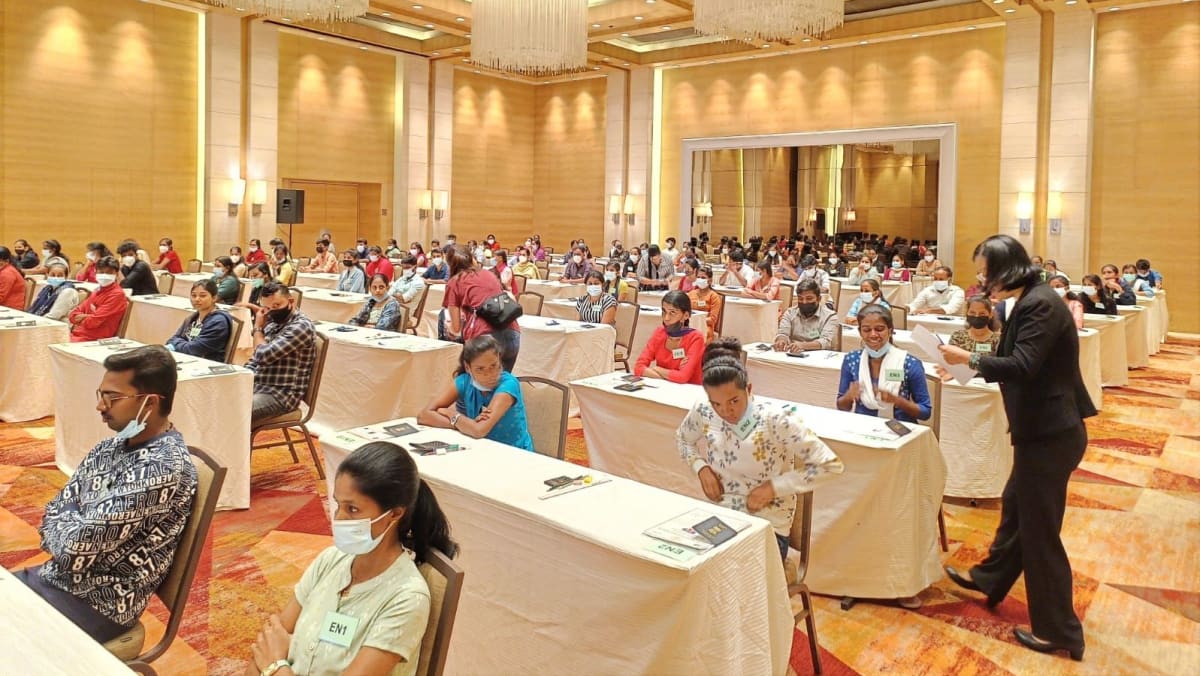
DEMAND FROM SINGAPORE
Dynamic Health Staff director Arun Kumar Ojha said nurses who choose to relocate to Singapore will receive a housing allowance of up to S$500 (US$375) a month, gratuity, and joining bonuses from the institutions they join.
The perks are one of the reasons why it has seen more Indian nurses interested in moving to Singapore recently. This interest is also matched by rising demand from Singapore.
There is “a lot of demand” from the private and public sectors in Singapore, said Mr Ojha, adding that the Ministry of Health Holdings in particular admitted a large number of candidates to the pre-registration process. The process means that nurses are exempted from the Singapore Nursing Board exam.
There is demand from healthcare institutions like National Kidney Foundation and nursing homes, he said.
Foreign nurses must adhere to criteria set by the Singapore Nursing Board and undergo supervised work stints in Singapore before they can be granted local registration.
“We work really closely with a lot of universities and colleges to amend and modify the curriculum to ensure students who are graduating as healthcare workers actually have the requirements that foreign employers want,” said Mr Varun Khosla, chairman at the employment agency.
The agency is set to prepare more than 100 nurses for the next recruitment drive in September.
Of the close to 4,000 new nurses expected to be onboarded this year, there will be a higher proportion of foreign to local nurses – with a ratio of about 60:40. This will make up for the slowdown in foreign nurse recruitment due to the COVID-19 border restrictions, Singapore’s Health Minister Ong Ye Kung said last year.
Even as Singapore ramps up foreign recruitment of nurses, the “large majority” of its nursing workforce will continue to comprise locals from nursing school intakes and mid-career training programmes, Mr Ong added.
Water parades and popsicles: Nursing homes find cool ways to fan off warm weather
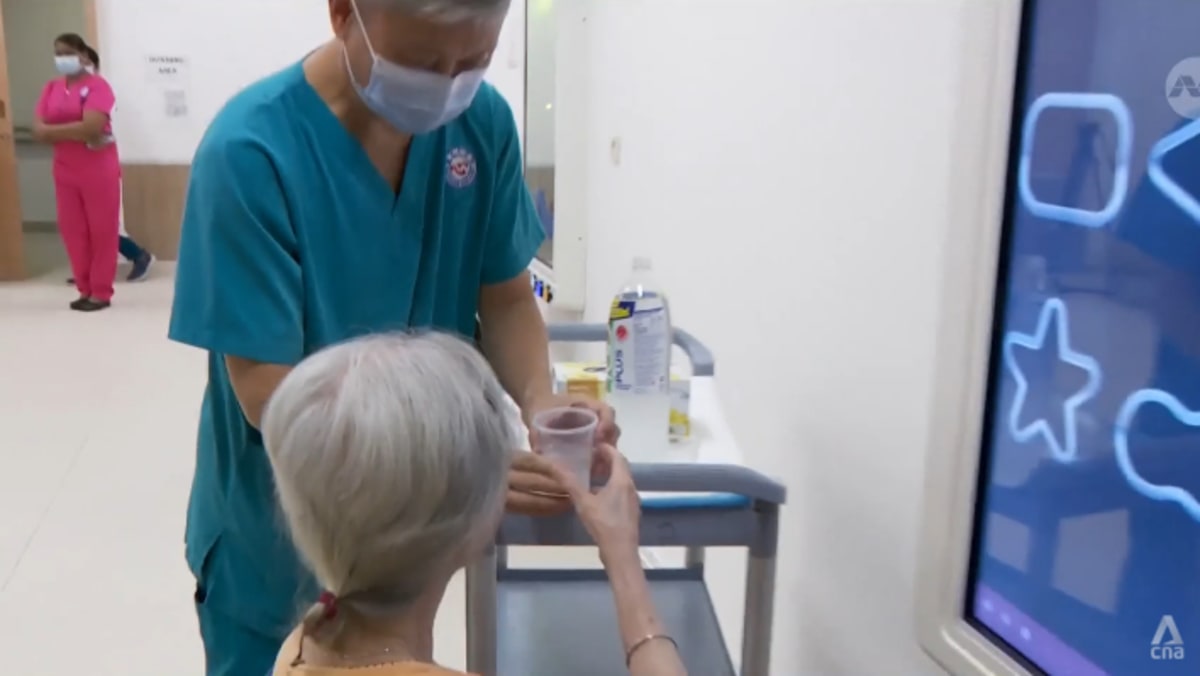
The social enterprise is also considering using cool paint for its building façades, which is capable of lowering the temperature inside by two degrees Celsius.
While the heat-reflective coat is more expensive than normal paint, the social enterprise said the benefits outweigh the cost.
“We are exploring more long-term and sustainable solutions,” said NTUC Health’s head of clinical services and residential care Goh Siew Hor.
“Both the cool paint and thermal film can potentially help to lower ambient temperature around the building and thus reduce the load on our air conditioners and also improve the thermal comfort for those in the building.”
EFFORTS TO KEEP COOL
Homes that are unable to make big changes to their infrastructure said they are making do with existing measures such as additional standing fans and cooling pads.
Nurses are also taking extra measures to monitor room temperatures and residents’ vital signs, with a lookout for heat-related conditions including giddiness, nausea, fatigue or rashes.
At the Thye Hua Kwan Nursing Home, its sensory room for residents with dementia is also being used as a makeshift heat shelter. It is one of the few rooms in the home with air-conditioning.
School wrecked by fireworks blast closed for repairs
Water in affected area still not fit for consumption, say health officials
PUBLISHED : 1 Aug 2023 at 16:49

NARATHIWAT: A school was among the dozens of buildings heavily damaged by Saturday’s huge fireworks explosion in Sungai Kolok and has been closed for two weeks for repairs.
Soraya Asae, the director of Ban Muno School, said the powerful blast damaged five school buildings and seven houses for teachers. The ceilings of the classrooms collapsed and windows were shattered. Structural damage was also found in the teachers’ housing. The total damage was estimated at 3 million baht, she said.
The school is located about 300 metres from the warehouse where at least a tonne of illegally stored fireworks blew up during a welding mishap on Saturday afternoon, killing 12 people, injuring 121 and damaging 292 buildings in the village of Muno near the Malaysian border.
Ms Soraya said the school would be closed for two weeks, with classes suspended starting from Thursday. Debris, scrap metal, broken glass and other materials scattered around the site will be removed and the damaged buildings and equipment will undergo repairs.
She said the incident happened so suddenly and unexpectedly, there was no time for the school to properly cope with it.
The school director expressed her thanks to Supot Maneeratanachot, director of the Area 2 primary education office, for giving bags of survival gear and some money to the teachers and students as a morale booster.
She said the school had opened a bank account to take donations to be used for the repairs.
Dr Chaiwat Pattanapisalsak, director of the Narathiwat public health office, said teams from the office were visiting residents affected by the explosion.
Dozens of people left homeless by the blast have been staying at a temporary shelter set up on the sports field of the Muno Subdistrict Administrative Organisation.
Health officials have found that the air quality within a 500-metre radius of the explosion site was still good, but the water was not suitable for use or consumption, said Dr Chaiwat.
Police have summoned the owner of the warehouse for questioning, but it remained unclear when he would come in, as he was reportedly on holiday with his family.
Thaksin will return by private jet, says old friend
PUBLISHED : 1 Aug 2023 at 16:23

Thaksin Shinawatra will return on a private jet, landing at Don Mueang airport, according to a senior member of the Chartthaipattana Party and close friend who recently visited the former prime minister.
Chartthaipattana secretary-general Praphat Phothasuthon made his prediction after returning from meeting Thaksin in Hong Kong, where the political fugitive celebrated his 74th birthday last week.
Mr Praphat, who is also 74, said he and Thaksin were old friends and he always went to see him on his birthday, wherever he was.
Mr Praphat quoted Thaksin as saying that he would return to Thailand on a private jet that would land at Don Mueang airport. He would then be taken to a court and was willing to go to jail if so required, according to Mr Praphat, who is also caretaker deputy agriculture minister. He did not say when Thaksin would return.
The Chartthaipattana secretary-general denied that he and Thaksin discussed any special political agreement during their meeting in Hong Kong. Mr Praphat pointed out that Chartthaipattana and Pheu Thai had enjoyed close ties for a long time.
The Pheu Thai Party is trying to form the new government in the wake of the May 14 general election. It came second with 141 House votes. The Move Forward Party won 151 House seats but failed to win parliament approval when it nominated its leader Pita Limjaroenrat for prime minister of July 13.
Thaksin’s daughter Paetongtarn Shinawatra is one of Pheu Thai’s three candidates for prime minister. She recently said Thaksin would return at Don Mueang airport on Aug 10.
Thaksin was overthrown by a military coup on Sept 19, 2006, while he was overseas. He has since lived in self-exile, based in Dubai, except for a brief visit to Thailand in 2008.
During his absence, the Supreme Court’s Criminal Division for Holders of Political Positions sentenced him to a total of 12 years imprisonment in four cases.
In the first case, the court found him guilty of abuse of power in his then-wife Khunying Potjaman’s purchase of state-owned land in Ratchadapisek area for less than the market value. In October 2008, he was sentenced to two years in prison. The 10-year statute of limitations on the court ruling expired in October 2018.
In the second case, Thaksin was sentenced to two years in prison after he was found guilty of malfeasance in a case concerning a two- and three-digit lottery.
In the third case, Thaksin was given three years in prison for abusing his position by authorising loans totaling 4 billion baht to Myanmar by the Export-Import Bank of Thailand. The loans were used to buy equipment from a telecom firm owned by his family.
In the fourth case, the former prime minister was sentenced to five years in prison when the court found him guilty of using nominees to hold shares in Shin Corp. The law prohibits any political office holder from owning shares in a telecommunications company.
The statute of limitations for the court decisions in the second, third and fourth cases has not expired.

Chartthaipattana Party secretary-general Praphat Phothasuton. (File photo)

